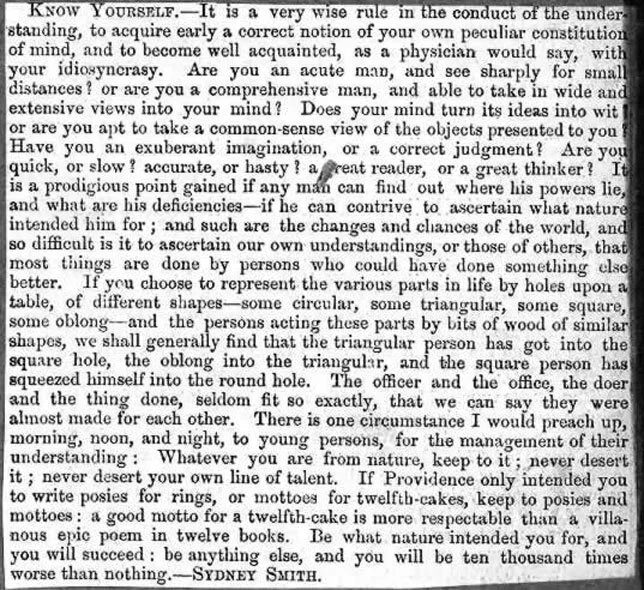Know Yourself
– It is a very wise rule in the conduct of the understanding, to acquire early a correct notion of your own peculiar constitution of mind, and to become well acquainted, as a physician would say, with your idiosyncrasy. Are you an acute man, and see sharply for small distances? Or are you a comprehensive man, and able to take in wide and extensive views into your mind? Does your mind turn its ideas into wit or are you apt to take a common-sense view of the objects presented to you? Have you an exuberant imagination, or a correct judgment? Are you quick, or slow? Accurate, or hasty? A great reader, or a great thinker? It is a prodigious point gained if any man finds out where his powers lie, and what are his deficiencies – if he can contrive to ascertain what nature intended him for; and such are the changes and chances of the world, and so difficult is it to ascertain our own understandings, or those of others, that most things are done by persons who could have done else better. If you choose to represent the various parts in life by holes upon a table, of different shapes – some circular, some triangular, some square, some oblong – and the persons acting these parts by bits of wood of similar shapes, we shall generally find that the triangular person has got into the square hole, the oblong into the triangular, and the square person has squeezed himself into the round hole. The officer and the office, the doer and the thing done, seldom fit so exactly, that we can say they were almost made for each other. There is one circumstance I would preach up, morning, noon, and night, to young persons, for the management of their understanding: Whatever you are from nature, keep to it; never desert it; never desert your own line of talent. If Providence only intended you to write posies for rings, or mottoes for twelfth-cakes, is more respectable than a villainous epic poem in twelve books. Be what nature intended you for, and you will succeed: be anything else, and you will be ten thousand times worse than nothing. –
